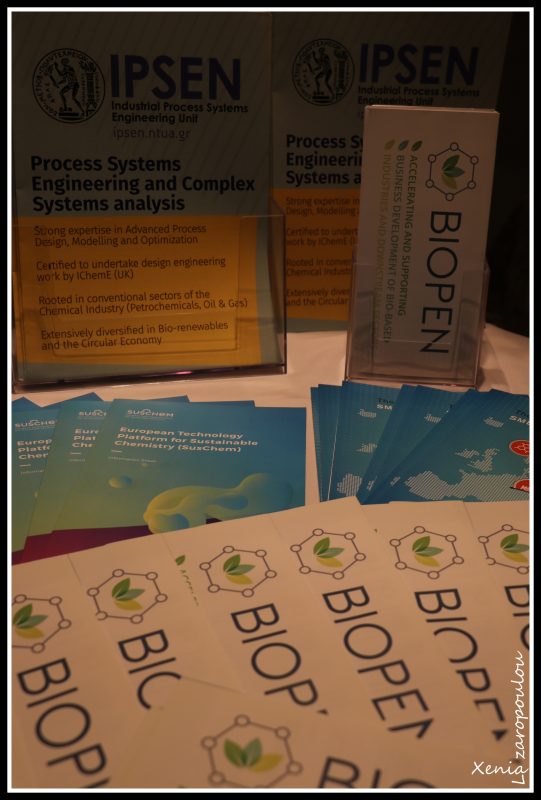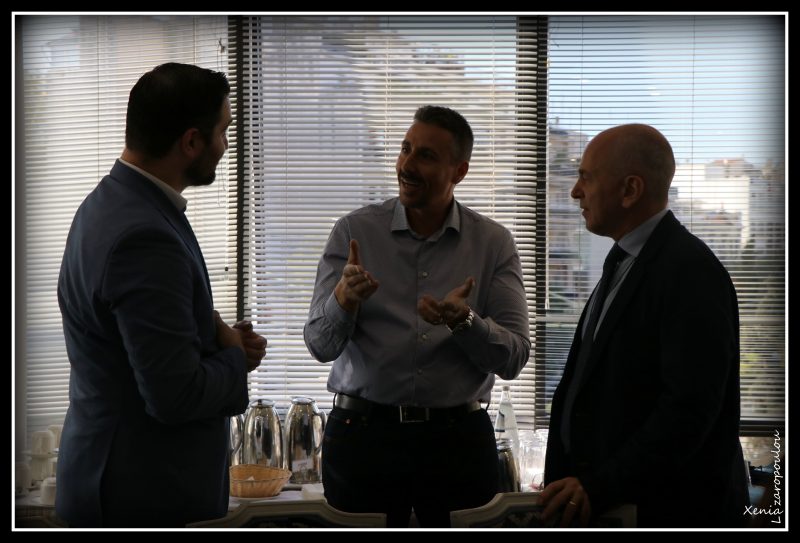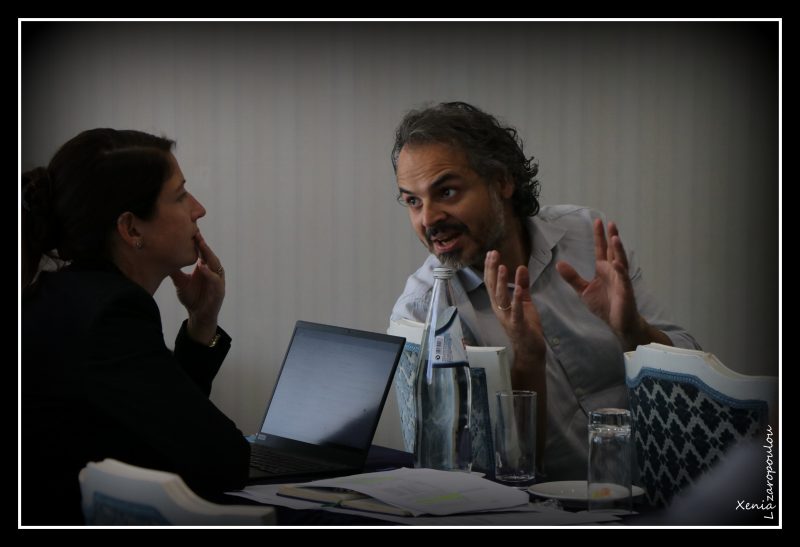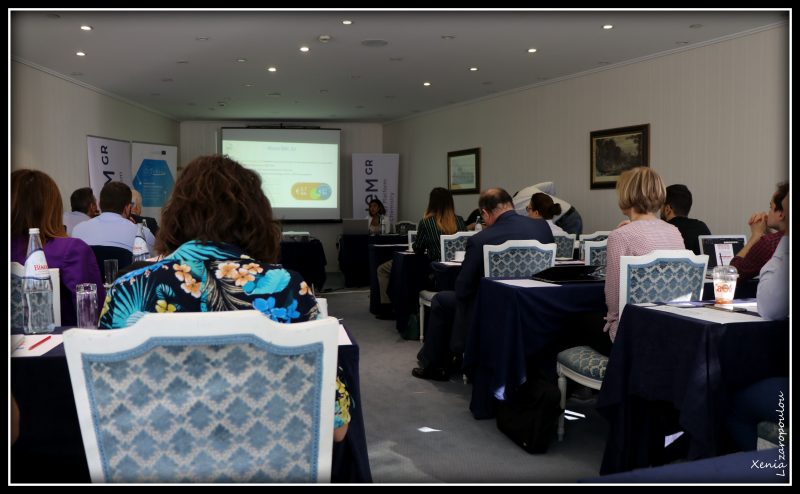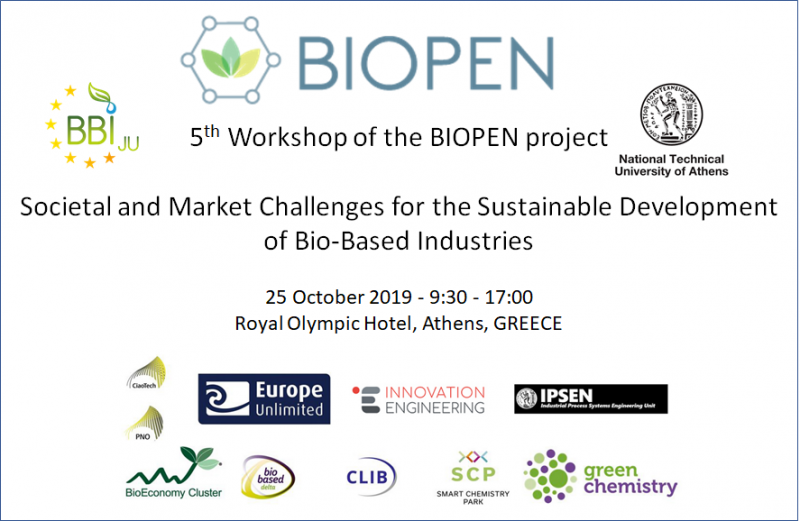 The 5th workshop of the BiOPEN project: ‘Open-innovation Platform strengthening cooperation and joint development of bio-based industries and downstream sectors’ entitled ‘Societal and Market Challenges for the Sustainable Development of Bio-Based Industries’ was successfully held on 25th October in Royal Olympic Hotel, Athens. Apart from delegates from the project’s consortium partners, key speakers representing a wide range of entities, from public sector regional associations to Greek, European and global networks as well as from networking EU co-funded projects to clusters. These speakers along with attendants from both the public and the private sector were focused on the most important social and environmental challenges that bio-based and other industries are called to address emphasizing in synergies of policies and business outlooks for capacity building and the support of customer driven networks.
The 5th workshop of the BiOPEN project: ‘Open-innovation Platform strengthening cooperation and joint development of bio-based industries and downstream sectors’ entitled ‘Societal and Market Challenges for the Sustainable Development of Bio-Based Industries’ was successfully held on 25th October in Royal Olympic Hotel, Athens. Apart from delegates from the project’s consortium partners, key speakers representing a wide range of entities, from public sector regional associations to Greek, European and global networks as well as from networking EU co-funded projects to clusters. These speakers along with attendants from both the public and the private sector were focused on the most important social and environmental challenges that bio-based and other industries are called to address emphasizing in synergies of policies and business outlooks for capacity building and the support of customer driven networks.
The event started off with welcome addresses by V. Liogas representing the Ministry of Environment and Energy, followed by Prof. A. Kokosis on behalf of NTUA – IPSEN, who hosted the event.
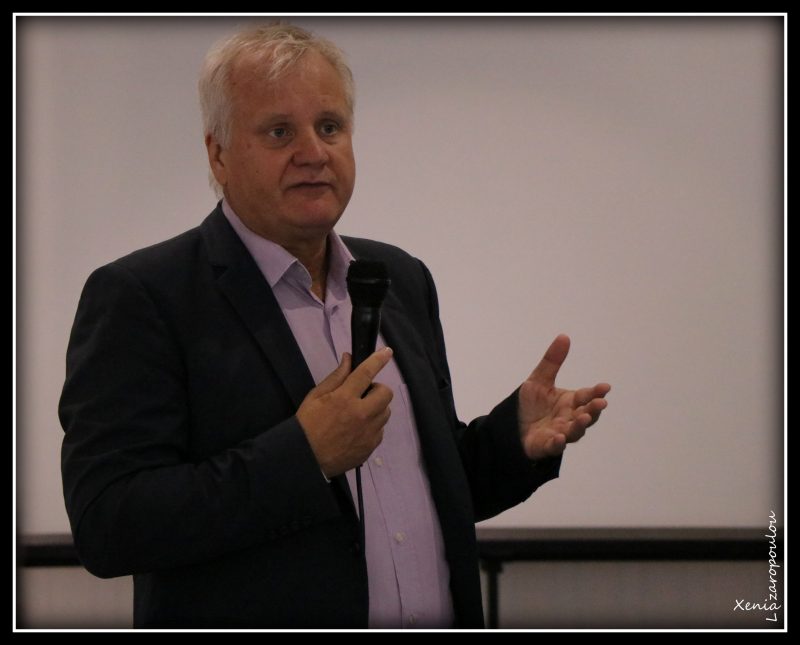
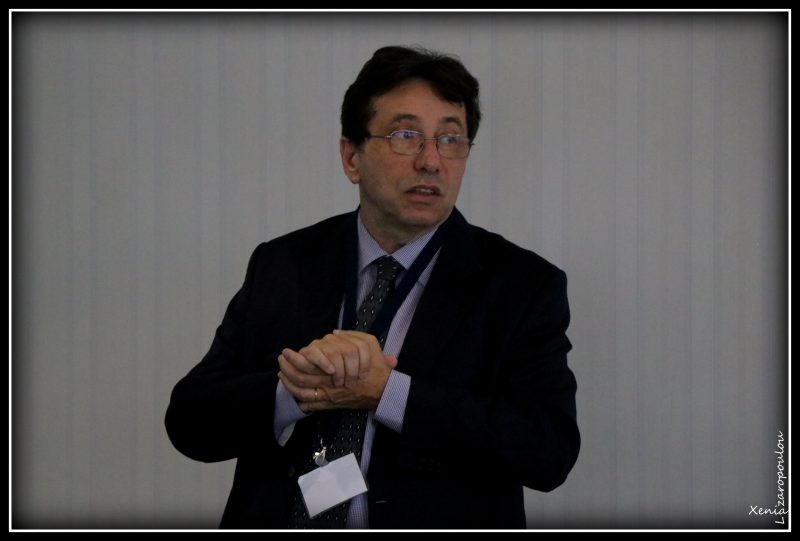
During the first session of the event, experts described the thematic domains of the BiOPEN Project and presented financial and networking instruments enabled to facilitate the boost of bio-based sector. In particular, Dr. A. Nikolakopoulos on behalf of NTUA – IPSEN (associate beneficiary of BiOPEN Project), presented the project in relation with its thematic domains by addressing market, societal and environmental needs as critical parameters for capacity building for bio-based industries. Continuously, Dr. S. Bikos on behalf of SusChem Greece, a greek networking platform for linking industries of the chemical sector, highlighted the role of this platform in building a sustainable industrial capacity network in Greece. Also, Dr. S. Bikos representing V. Filipousi and on behalf of SusChem Europe emphasized on the priorities which are given at European level concerning aspects of circular economy in the form of industrial symbiosis.
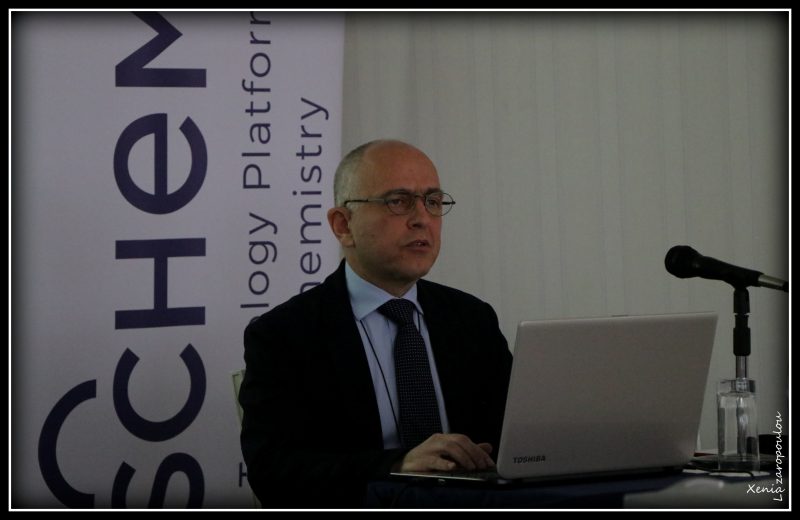
Concerning the funding instrument of BiOPEN project, namely Bio-Based Industries Joint Undertaking of H2020 and its national local point in Greece, K. Sidiropoulou presented the topics and the priority axes as well as upcoming calls for proposals in relation with bio-based industrial sector at both Greek and European level. Next, in relation with more technical aspects of BiOPEN project’s actions, Dr. A. Nikolakopoulos described in detail the operational parameters of an open innovation platform capable to stimulate the business and innovation potential of the bio-based sector in Europe. Furthermore, the usage of this platform was correlated with the involvement of public bodies towards the formation of a bio-based economy, the policies that need to be addressed as well as issues related with business outlook. In addition, Prof. A. Kokosis stressed out the necessity for the fine tuning among bio-based industries towards the consideration of societal and market needs for bio-based end products.
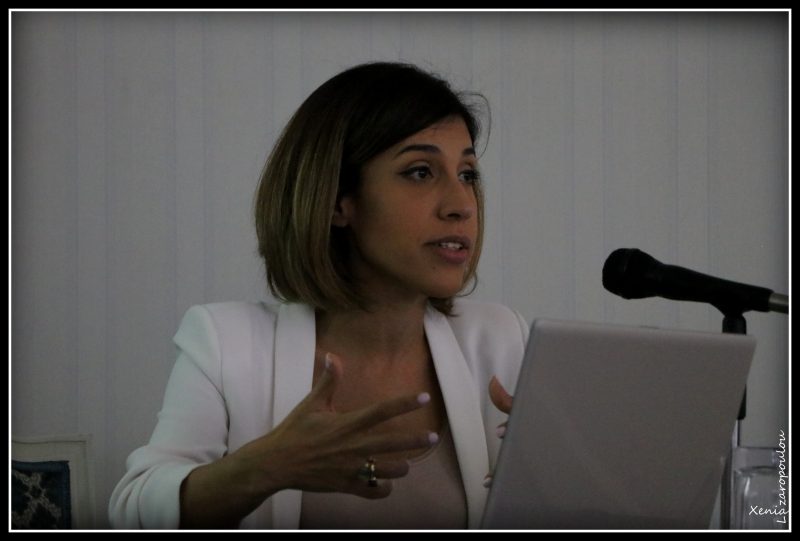
The second session of the event dealt with presentations that were related with paradigms of customer driven networks in relation with – but not limited to – bio-based sector. Firstly, P. Basta on behalf of Whirlpool EMEA (coordinating beneficiary of LIFE MATHER Project), highlighted the use of public shared ICT tools that are monitoring chemicals and disclosure related with the production of electrical and electronic appliances, as a mean for increasing business competitiveness by involving customer driven networks. In addition, K. Kalafata representing Appliances Recycling SA (coordinating beneficiary of LIFE REWEEE Project), stressed out the concept of re-use of electrical and electronic appliances through the development of the two – open to public – WEEE re-use centres which are operating for the first time in Greece as part of the LIFE REWEEE Project implementation actions.
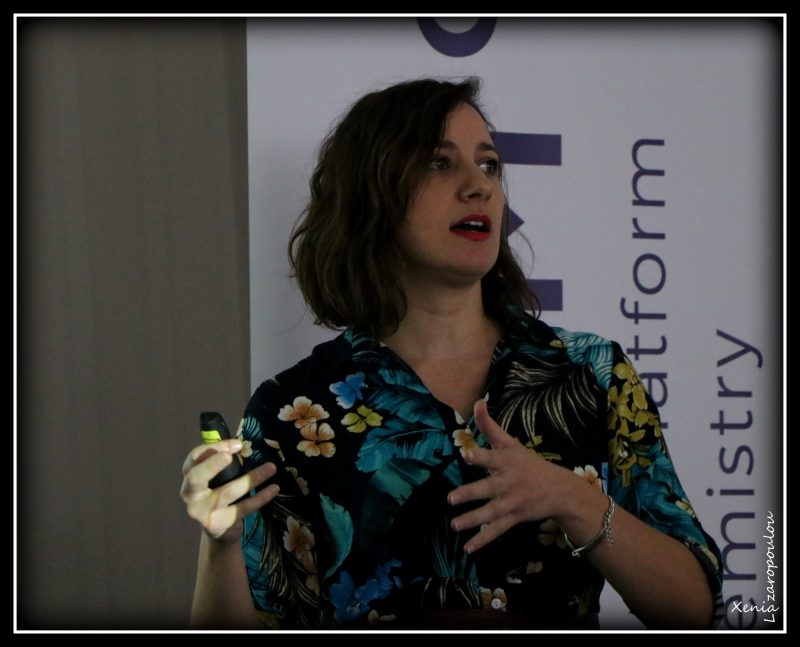
Concerning customer driven networks as enablers for boosting bio-based sector, A. Gentimis on behalf of NTUA – IPSEN presented paradigms of web-based platforms for the development of symbiotic networks in relation with sustainable management of biowaste fractions towards circular economy. In addition, T. Giourkas on behalf of CLuBE, a Bioeconomy and Environment Cluster located at Kozani of Western Macedonia Prefecture, presented SCALIBUR, a H2020 project aiming at the promotion of a holistic consortium to cut urban biowaste and replace it with a new production chain of biomaterials, by forming a partnership of end users to recover and transform biowaste into value added products.
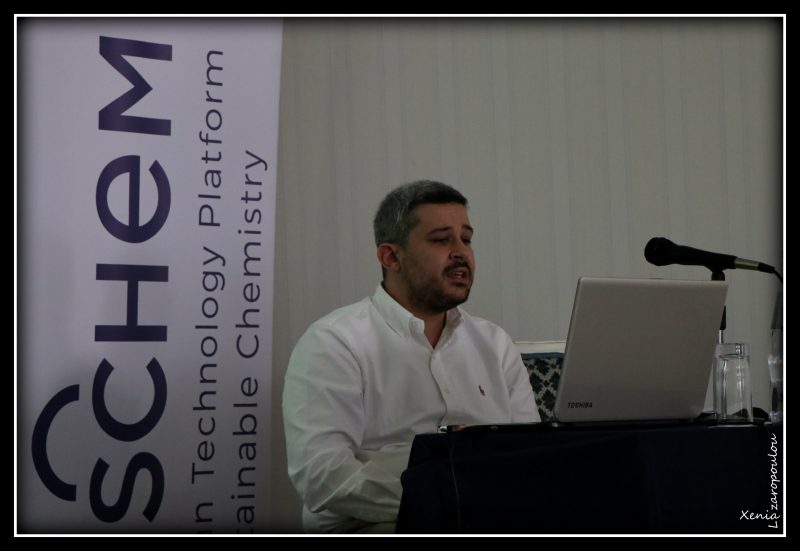
The third session of the event dealt with capacity building networks for bio-based industries in relation with the management of municipal organic waste. It started off with P. Kafasis on behalf of DIADYMA SA which is the Waste Management Association of the Western Macedonia Prefecture. P. Kafasis presented the applied scheme for the integrated municipal solid waste management at the respective region which is based on source separation of biowaste and other recyclables, as well as, the infrastructures where these waste streams are processed for the production of compost and recycled materials respectively. Next, P. Panteli on behalf of ESDAK, the Association of Solid Waste Management at the Cretan Prefecture, presented the results of LIFE FOOD FOR FEED Project where its primary objective was the evaluation – through a pilot-scale demonstration – of an innovative and simple technology that enables the safe transformation of food waste from hotels and restaurants), into animal feed.
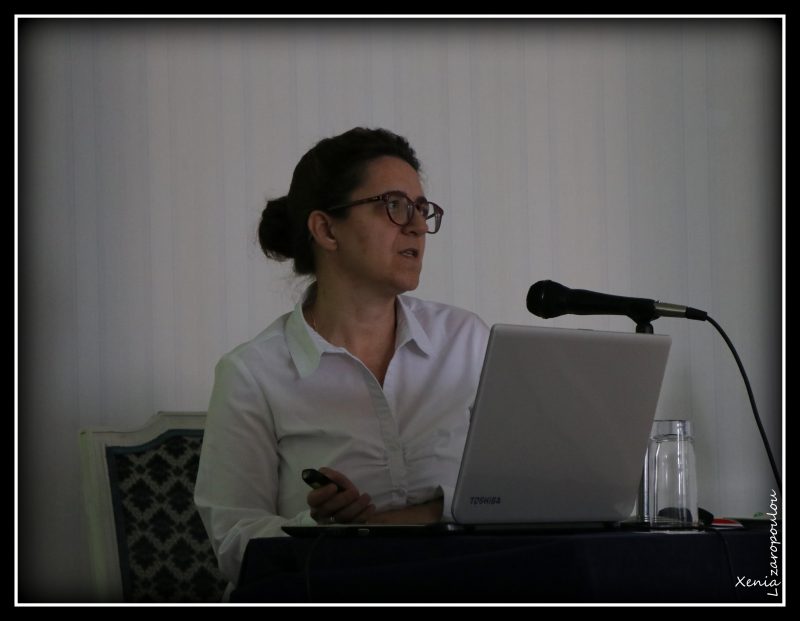
Subsequently due to the last minute absence of K. Paterakis as representative for DEDISA SA, the Regional Association of Solid Waste Management at the Cretan Region of Chania, Prof. A. Kokosis took over in order to present the integrated solid waste management scheme that is applied including the description of infrastructures where biowaste are processed for compost production. Next, A. Gentimis representing T. Dalamagas and on behalf of the cluster named SYMBIOLABS, presented a novel accountable IT infrastructure for supply chain management in biomass symbiotic networks for the sustainable management of agricultural and bio-based industrial waste streams. Finally, on behalf of the Greek branch of Waste-to-Energy Research and Technology Council (WtERT), a global network for providing solutions in relation with the best available technologies for the treatment of various waste materials, Prof. S. Vakalis highlighted perspectives for organic waste management through the exploitation of waste-to-energy technologies.
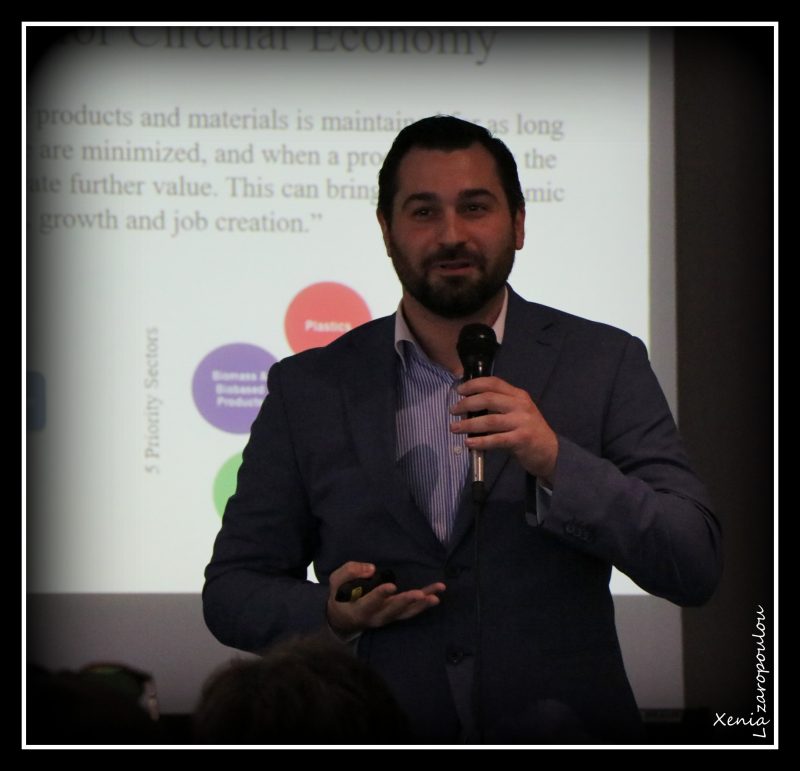
The event closed with an open discussion and concluding remarks as for the fine tuning among market and societal needs, as critical parameters for the boosting of bio-based industries. Along these lines, a questionnaire related to social and market needs and proposed strategies for fine tuning the two was presented and feedback was requested, which will be analyzed and the results will be included in the final deliverable of Task 3 of the BIOPEN project. Furthermore, representatives from the regional and prefecture associations, interacted with attendants as for the parameters which are affecting the operational cost of the logistic chain and infrastructures developed for municipal solid waste management and basically, biodegradable fractions and how this cost is passed on to citizens in the form of municipal taxes.
